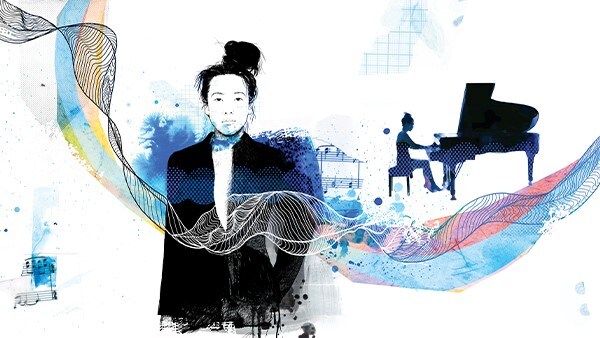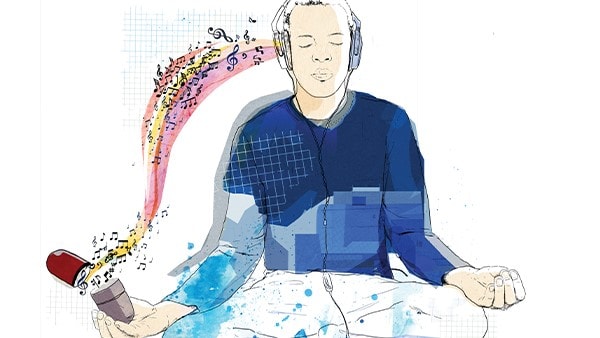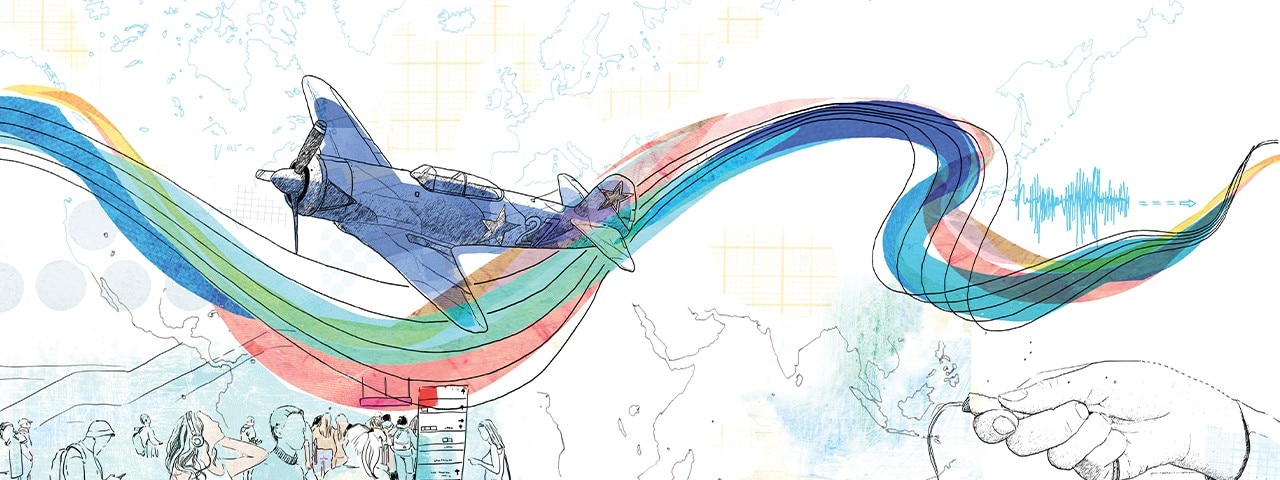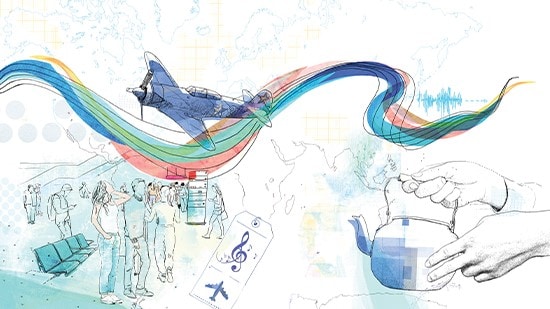The Art of Sound
For Rosey Chan, the soft purr of a heritage car engine or ambient sounds from the natural world are catalysts for a unique body of therapeutic works.
Rosey Chan drums her fingernails on the lid of a metallic teapot before pouring me a cup of mint tea. “I love exploring different sounds that we take for granted, be that a tinny noise like this or the creaky woody sound produced by a door slowly closing. Each sound has a unique beauty,” she says.
A classically trained pianist who studied at the Royal College of Music and who is now a London-based multimedia artist, musician and composer, Chan is fearless in her quest to record nuanced sounds. Whether capturing the roar of a vintage fighter plane from a cramped passenger seat as it performs aerial acrobatics or dashing out into a thunderstorm to document raindrops ricocheting off a stone wall, she hears rhythm in music wherever she goes.
And Chan is unapologetically ambitious with her ideas. Her music is an amalgamation of stirring compositions, musical improvisations and selected classical repertoire along with electronic and genre-bending sonic influences. In May 2022, she will unveil the latest chapter in her experimentation with sound and art at her first solo show in London.


Her newest venture, Sonic Lab, was created as a place for all her multi-disciplinary ideas and projects to co-exist on one platform. The lab even has its own advisory board made up of neuroscientists and experts in holistic health and sleep, as well as an eclectic mix of designers, pioneering visual artists and frequency advisors, many of whom were instrumental in her acclaimed 2021 album, Sonic Apothecary.
“I’m no scientist, of course, but I wanted to find out more about the effects of sound waves on the brain and its neurotransmitters. For instance, why is it that a piece of music resonates with me better than other pieces of instrumental music and why is it that different genres of music can stimulate different emotions?” she asks.
Imagined during the initial stages of the pandemic, just as the world was locking down, Chan started writing the music for Sonic Apothecary as part of a process to heal herself during those first lonely weeks of lockdown and a desire to help others who were also struggling with the unexpected effects of isolation on their sleep patterns, mental health and stress levels. Until then, she says, music had been an aesthetic choice for most, but now they were starting to look at it as a therapeutic experience.
Just as she was putting her findings into practice, a famous friend, the architectural designer Thomas Heatherwick, likened her to a ‘musical pharmacist’, dispensing music as a tonic for modern-day afflictions. The concept of ‘apothecary’ instantly chimed with Chan because some of her own family practices Chinese medicine. This, in turn, prompted the name Sonic Apothecary and her new music-for-healing ethos to support mind, mood and emotions through prescriptive music.
“Thomas is always pushing my buttons, which is great as I do the same with him,” says Chan. “A lot of architects relinquish responsibility for sound within contemporary spaces. They tend not to worry about the acoustics in multi-function buildings, so I’ll ask Thomas things like: ‘What if it’s a corporate space and needs to accommodate a band?’ or ‘What kind of conversations go on between you and the client when it comes to architectural aesthetics versus all-encompassing sound?’”
As for the mutual inspiration, Heatherwick says: “While I’ve been busy thinking about the emotional impact of the physical buildings and places that my team and I create, I’m envious of Rosey’s world of amazing music for its intravenous quality that instantly hits your emotions without any confusing visual dimension – going straight into your soul.”
Sonic Apothecary was subsequently recorded during a month-long artist’s residency at London’s Hotel Café Royal. Home to just a handful of guests at the time, it must have felt eerily quiet for someone like Chan who is used to playing to large audiences at Carnegie Hall. Still, she played late into the night on her beloved Steinway, brought in especially for the duration of her stay, and invited talented friends to come and explore the creative process with her by day. Duran Duran’s Nick Rhodes, the actor Charles Dance and the designer Tom Dixon are just a few of the famous names who dropped by for poetry recitals, brainstorming or impromptu jamming sessions. Within days of Sonic Apothecary’s release, it clocked up 10 million streams. “It was so rewarding to know that it had instantly touched 10 million hearts,” Chan says.
For now, though, her focus is on composing bespoke music for travel, all of which stems from a love of heritage engine sounds. “I love visiting vintage car shows around the UK. Last year, I got the chance to record a beautiful, rare Rolls-Royce Silver Ghost engine and put the sound of the vibrations to music,” she recalls.
She is conceptualising a continuous stream of music to accompany travellers throughout their journey – from private jet to chauffeur-driven car and then to hotel suite. On Sonic Lab’s part in creating bespoke music for a private jet and airport lounges, she says: “It’s surprising how much music isn’t considered as part of the original architectural brief. Most times, we are brought onboard later as a means of engaging the traveller, incentivising the traveller journey, supporting calls to action and, of course, entertainment.
“The challenges differ greatly due to the overall objectives such as the traveller experience, use of space, acoustics, audio medium (headphones/speakers), length of flight and so on. There are no set rules, but we start each project with a detailed understanding of the brief and ascertain how we meet both client and traveller needs. Only then can we effectively look to undertake a project and meet the challenges,” she explains.
In a clear case of ‘the sky’s the limit’, in 2021, armed with her recording gear, she leapt at the chance to fly in one of only a dozen Yak-3UTI Russian fighter planes in operation today. Learning to fly seemed an obvious next step, so she enrolled at a club just outside London. “It’s a bit like training in classical music – the discipline, focus and commitment required was very attractive to me. I’m addicted to refining skills and ideas, whatever they may be, and flying pushed my brain to think differently.”
But the real magic happens once she touches down. “As soon as I land, I have this great burst of creative inspiration and exhilaration, which, in turn, inspires a different way of composing. That’s why I like to experience all these different adventures. I like anything that’s a little dangerous and a bit crazy.”
She would be flying today but, with winds of 80mph recorded in some parts of the country, she’s officially grounded. “It’s probably for the best,” she says, trying to shut the unruly glass door of her penthouse studio as it swings dangerously on its hinges.
“See! Everything comes back to sound,” Chan exclaims as the wind continues to whip around the London skyline.
You can find out more about Rosey herself at roseychan.com

 For Rosey Chan, the soft purr of a heritage car engine or ambient sounds from the natural world are catalysts for a unique body of therapeutic works.
For Rosey Chan, the soft purr of a heritage car engine or ambient sounds from the natural world are catalysts for a unique body of therapeutic works.

